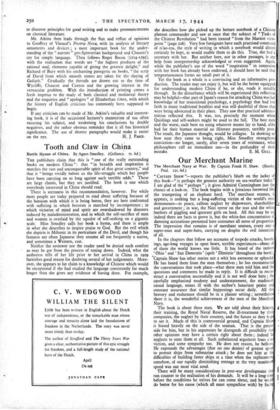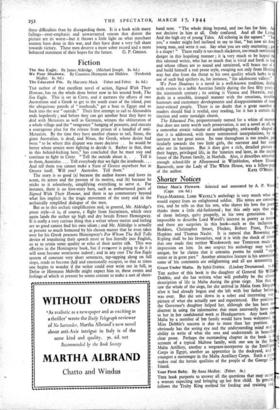Our Merchant Marine
"CAPTAIN SHAW "—reports the publisher's blurb on the jacket of this book—" is perhaps the greatest authority on sea-warfare today." I am glad of the " perhaps " • it gives Admiral Cunningham just the chance of a look-in. The book begins with a ferocious foreword like the trumpeting of an elephant herd. The merchant seaman, it appears, is nothing but a long-suffering victim of the world's mis- demeanours—in peace, callous neglect by shipowners, shareholders and government ; in war, the Nazi terror on the seas and the white feathers of giggling and ignorant girls on land. All thiS may be so. indeed there are facts to prove it, but the white-hot concentration of damning accusations presented here consumes all sense of proportion. The impression that remains is of merchant seamen, every one a super-man and super-hero, carrying on despite the evil intentions of all.
In the chapters that follow are accounts of torpedo attacks, bomb- ings, age-long voyages in open boats, terrible experiences—about all of them the world knows too little. It has heard of the tankers ' Ohio ' and San Demetrio ' (spelt Dimitrio ' throughout the book); 'Captain Shaw has other stories not a whit less awesome or splendid. He has heard them from the men themselves ; he has reconstructed the conversations that took place—what these men told him and the questions and comments he made in reply. It is difficult to recon- struct a conversation successfully and it is not well done here ; the carefully emphasised modesty and understatement, the studiousl% casual language, mixes ill with the author's luxuriant praise and constant assurance that similar happenings occur daily. All this bravery and endurance should be in a plainer setting • nevertheless there it is, the wonderful achievement of the men of the Merchant Navy.
The book is about these men. We are told about their history their training, the Royal Naval Reserve, the ill-treatment by the companies, the neglect by their country, and the future as they hop to see it. Much of this is controversial ground, and Captain Sha is biased heavily on the side of the seaman. That is the proper side for him, but in his arguments he disregards all possibility tha other opinions may have a certain right about them ; indeed h neglects to state them at all. Such unbalanced argument loses c. viction, and some sympathy too. He does not reason, he bellow He expounds the advantages (that no one denies) of greater spee to protect ships from submarine attack ; he does not hint at th difficulties of building faster ships at a time when the replacemen somehow, of our rapidly diminishing tonnage at the very maxima speed was our most vital need.
There will be many considerations in post-war development th run counter to the realisation of his demands. It will be a long t before the conditions he strives for can come about, and he wool do better for his cause (which all must sympathise with) by faci
these difficulties than by disregarding them. It is a book with many failings—over-emphasis and unwarranted venom that distort the picture are its worst—but it throws a little light on what merchant seamen have done in this war, and they have done a very full share towards victory. These men deserve a more sober record and a more
balanced statement of their hopes for the future. G. P. GRIGGS.



























 Previous page
Previous page